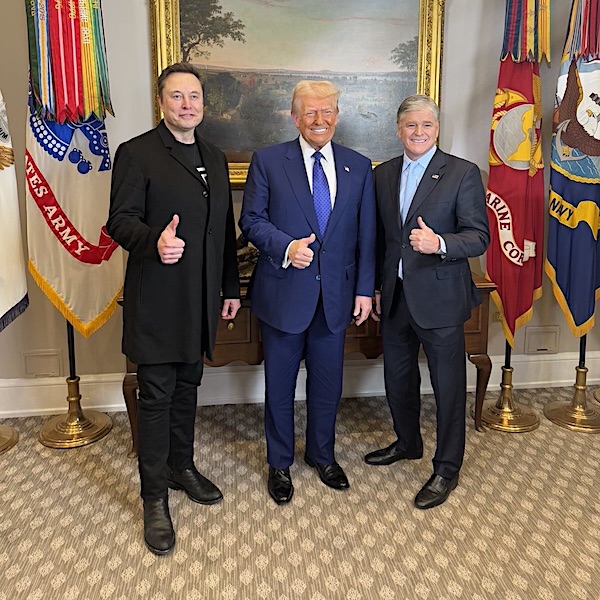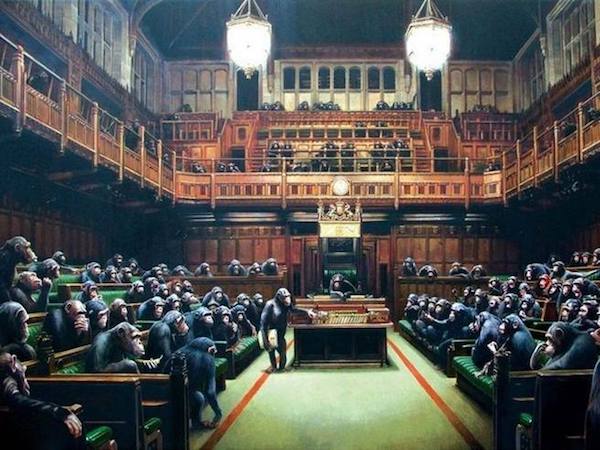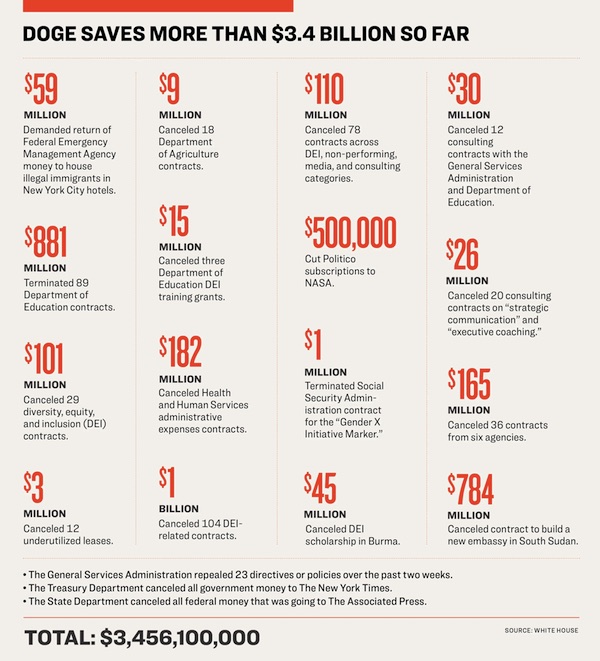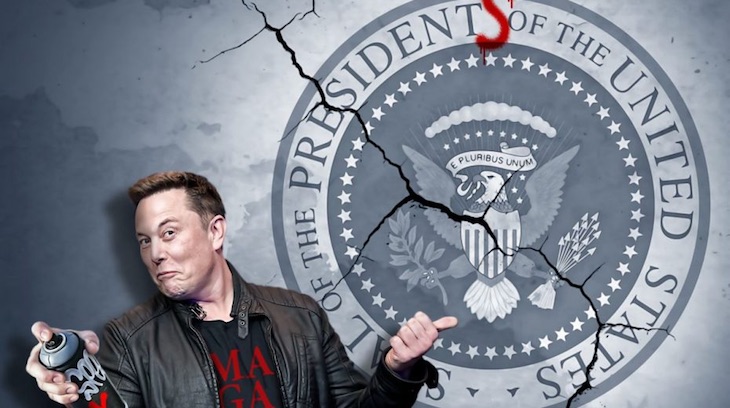
Pablo Picasso Nude on a beach 1929



Yes
Yes
pic.twitter.com/z9jaU2UWwh— Elon Musk (@elonmusk) February 18, 2025
Leavitt
NEW – Leavitt Sets the Record Straight on Musk’s Official Role at DOGE |
"Elon Musk is a special government employee here at the White House, serving at the direction of the President of the United States, Donald Trump."
"Elon Musk has been tasked with overseeing DOGE on behalf… pic.twitter.com/qKEbwe6KkV
— Overton (@overton_news) February 18, 2025
Apple
Trump Drops Economic Bombshell! THE BIGGEST Company In the World (Apple) Is Returning To The United States, 47’ Revealed During A Historic Mar-A-Lago Press Conference.
Trump left little to the imagination when he said "THE BIGGEST" company in the world was coming back to the… pic.twitter.com/cWezTu6vHk
— Alex Jones (@RealAlexJones) February 18, 2025
Library
Obama’s Presidential library has been in the works for 8 years— and it’s only half done. Originally, it was supposed to cost $350 million, but a couple of snowy winters later — the price tag is now over $800 million. But @BarackObama’s library was doomed from the start… pic.twitter.com/bG1ASImZBV
— Jesse Watters (@JesseBWatters) February 19, 2025
RFK
RFK Jr. agrees to rescind the Biden administration's HHS rule requiring doctors receiving federal funding to conduct gender transition procedures, including hormones, puberty blockers, and surgeries.
"We don't let children drink. We don't let them drive an automobile, because… pic.twitter.com/fkmHWHbLMz
— Wide Awake Media (@wideawake_media) February 19, 2025
Germany
— Elon Musk (@elonmusk) February 18, 2025
No AI
"I'm glad to say that the Starship mission was done entirely with human brains without any use of AI
The future of AI might look at that and say not bad for bunch of monkeys."
Elon Musk
pic.twitter.com/34IKzzqQUM— Tesla Owners Silicon Valley (@teslaownersSV) February 19, 2025
MIller
JUST IN: Stephen Miller starts laughing at CNN's Brianna Keilar while explaining to her how the government works as if she's a child.
"I understand that even a temporary interruption in federal employment is a great crisis, a catastrophe for you and for CNN."
"What the American… pic.twitter.com/omyJJXn6Gu
— Collin Rugg (@CollinRugg) February 18, 2025

Ever since Jan 20 I find it harder to keep the Debt Rattles limited to the 15 or so articles that I think are the ideal number. People need to be able to concentrate, and at 20 I find that’s already too hard. But it means I have to throw out ever more of what I read. A luxury problem that indicates things are changing for the better, and they do so rapidly.
I’ll open today with the interview Trump and Musk did wih Sean Hannity, because all three are in fine shape, and it gives a good impression of how much Trump and Musk appreciate each other. Completely different guys, who are also a whole generation apart, but they get along very well. I think what brought the entire dream team together is the realization that the country, and the world, were heading for an abyss. And that Trump realized that perhaps first of all, and was the only person fit to be the president who could turn the ship around.
Of course they also admired his fighting spirit, demonstrated not only when he was shot at and rose up, but perhaps even more through hour after hour after hour of lawfare sessions in courtrooms. Instead of retiring to Mar-a-Lago. Everyone he works with now has recognized that. Interview: highly recommended.
• Musk Says “Trump Is A Good Man” In Hannity Interview (ZH)
President Donald Trump and Elon Musk discussed waste, fraud, abuse, and more in a joint interview with Sean Hannity that aired on Feb. 18. The world’s wealthiest man and the president of the United States defended the Department of Government Efficiency (DOGE), now facing political opposition and numerous lawsuits as it slashes government spending – including negative publicity for firing and then seeking to rehire key nuclear weapons workers. Setting the scene for the entire discussion, Musk described going to a dinner party before the election and how the reaction of other guests to him mentioning Trump’s name was “like they got shot with a dart in the jugular that contained, like, methamphetamine and rabies.” “You can’t have a normal conversation,” Musk added, saying that people become “completely irrational” when Trump is discussed.
— Donald J. Trump (@realDonaldTrump) February 19, 2025
Musk also sought to make it clear he stands with Trump and vice versa. “I think President Trump is a good man,” the tech entrepreneur said. Trump reciprocated, saying he “couldn’t find anyone smarter” than Musk to assist his administration. Musk, best known for his work with SpaceX, Tesla Motors, and other tech firms, publicly backed Trump after an attempt on his life at a rally in Butler, Pennsylvania, in July 2024. But the tech titan’s support was apparently already in the cards. During the Feb. 18 joint interview, Musk said that he was “going to do it anyway.” The assassination attempt, which claimed the life of Corey Comperatore, simply accelerated Musk’s timeline. “I sped it up,” Musk said. The president said he “didn’t know that” about Musk’s endorsement. Musk went on to stump for the then-candidate. He also donated hundreds of millions to backing Trump.
Here’s the full Trump and Elon Musk interview with Sean Hannity. pic.twitter.com/uxcmLyvSNM
— Ian Miles Cheong (@stillgray) February 19, 2025
Musk said his time with Trump deepened his appreciation of the president’s character—a point of contention for Trump’s critics, including some of the Republicans who contested him during the 2024 primary. “Not once have I seen him do something that was mean or cruel or wrong,” Musk said. The two men also talked about the publicity around their joint efforts, accusing the media of trying to fracture their relationship. As DOGE was taking shape after Election Day, some news outlets reported that Musk’s ascendance was elevating him to a quasi-presidential role, a line of argument advanced by some Democrats. Trump said Musk phoned him to say, “‘You know, they’re trying to drive us apart.’” “It’s just so obvious. They’re so bad at it. I used to think they were good at it. They’re actually bad at it, because if they were good at it, I’d never be president,” he added.
Musk also affirmed his commitment to advancing, and not usurping, the elected president. He pointed out that his T-shirt read, “Tech Support.” “I’m going to provide the president with technology support,” he said. “It’s a very important thing because the president will make these executive orders which are very sensible and good for the country, but then they don’t get implemented.” The interview also touched on potential conflicts of interest between Musk’s businesses and DOGE. Many of the entrepreneur’s firms have benefited from extensive government support, from subsidies for Tesla’s electric vehicles to Pentagon contracts with SpaceX. Sen. Richard Blumenthal (D-Conn.), a critic of DOGE and Musk, mentioned those possible conflicts in an interview with The Epoch Times earlier on Feb. 18, saying they “ought to deeply trouble progressives.”

Hannity asked Trump about how his administration would handle potential cuts to such areas. Trump said Musk would be kept away from them. Musk said he would steer clear of those minefields, too. “I’ll recuse myself,” he said. The wide-ranging interview repeatedly landed on the topic of DOGE’s employees, which include many engineers. The president said that Musk “attracts a young, very smart type of person—I call them high-IQ individuals.” “These guys are smart, and they love the country,” Trump added. Musk said DOGE’s software engineers “could be earning millions of dollars a year instead of earning a small fraction of that as federal employees.” Trump described the DOGErs as “very committed people.” One DOGE aide in the Treasury Department resigned after reporting revealed his history of controversial online posts. Vice President JD Vance and Trump supported his rehiring, after which Musk announced he would be reinstated.
The trio also discussed a plan to accelerate the rescue of NASA astronauts Sunita Williams and Butch Wilmore. Initially slated for an eight-day mission, the pair have been stuck on the International Space Station (ISS) since June due to mechanical issues with the Boeing Starliner spacecraft that would have taken them home. Trump, in January, said he asked SpaceX CEO Musk to expedite their return. NASA has since moved up a scheduled April return to March. Williams and Wilmore will come back to Earth after the SpaceX Crew-10 mission reaches the ISS. In the Feb. 18 broadcast, Trump said the two “got left in space,” blaming his predecessor, former President Joe Biden. Musk said the astronauts’ return “was postponed kind of to a ridiculous degree.” “We don’t want to be complacent, but we have brought astronauts back from the space station many times before, and always with success,” he said.
The pair also talked about just how much waste, fraud, and abuse they expect DOGE to identify. The president said DOGE was pinpointing “billions—and it will be hundreds of billions—of dollars worth of fraud.” He predicted Musk would identify $1 trillion in what Hannity called “waste, fraud, abuse, corruption,” adding that he believes that to be “a very small percentage” of that sort of suspect spending. Musk did not dispute the trillion-dollar figure. The technologist said that saving money for the American taxpayer “comes down to two things: competence and caring.” “It stands to reason that if you don’t have competence and you don’t have caring, you’re going to get a terrible deal,” he said. Trump said that government contracts are not whittled down by the kind of give-and-take common to private-sector negotiations. “Everybody expects to be cut,” he said.

“It seems rather fitting that the test of whether Trump truly has presidential authority will come down to whether or not he can say, “You’re fired!”
• The Supreme Court’s Golden Opportunity to Restore Trump’s Authority (O’Neil)
Is Donald Trump a president in name only? The very idea seems absurd, but federal judges have issued injunction after injunction after injunction, blocking the president’s ability to exercise executive authority—the very authority the Constitution clearly vests in him. Trump has appealed one of these injunctions to the Supreme Court, urging the justices to uphold his authority to fire bureaucrats who work in the executive branch. When Trump fired Hampton Dellinger, head of the Office of Special Counsel, on Feb. 7, Dellinger responded by filing a lawsuit. After issuing an “administrative stay” on Feb. 10, a federal judge issued a two-week temporary restraining order on Feb. 12, blocking Trump from firing Dellinger. A panel of judges on the Court of Appeals for the Washington, D.C., Circuit upheld the restraining order.
Trump and key leaders in his administration appealed the case to the Supreme Court, allowing the justices an opportunity to vindicate the president—not only in this case but also as he faces a torrent of court orders blocking him from fulfilling his duties as president. As Sarah Harris, acting solicitor general, writes in the Supreme Court brief, “Until now, as far as we are aware, no court in American history has wielded an injunction to force the president to retain an agency head whom the president believes should not be entrusted with executive power and to prevent the president from relying on his preferred replacement.” The Office of Special Counsel aims to protect whistleblowers within the federal government. Congress established the office as an “independent agency,” but Harris argues that its functions fall under the executive purview of the president.
Harris cites Trump v. U.S. (2024), in which the Supreme Court held that presidents enjoy immunity from prosecution for fulfilling their essential duties. “Investigative and prosecutorial decision-making is ‘the special province of the executive branch,’” the court ruled. The Office of Special Counsel describes itself as an “investigative and prosecutorial agency.” Harris also cites the court’s ruling that “Congress cannot act on, and courts cannot examine, the president’s actions on subjects within his ‘conclusive and preclusive’ constitutional authority”—including “the president’s ‘unrestricted power of removal’ with respect to ‘executive officers of the United States whom [the president] has appointed.’” She also cites two cases in which the Supreme Court struck down as unconstitutional Congress’ attempts to insulate federal bureaucrats from the president’s ability to fire them: Selia Law v. Consumer Financial Protection Bureau (2020) and Collins v. Yellen (2021).
“Enjoining the president and preventing him from exercising these powers thus inflicts the gravest of injuries on the executive branch and the separation of powers,” she argues. Critics argue that if the president can fire anyone in the executive branch, that will create a “spoils system” in which the entire federal bureaucracy is replaced after every election, and newly elected presidents can bring in their cronies in a way that “politicizes” the administrative state. This will rid America of its “expert” and “scientific” bureaucratic class, bringing about some vague societal doom, to hear the critics say it. This is hogwash. The administrative state is inherently political, and beneath the bureaucratic veneer of scientific objectivity lies a set of worldview assumptions that usually align with the political Left.
As my book, “The Woketopus: The Dark Money Cabal Manipulating the Federal Government,” reveals, left-wing pressure groups influenced the administrative state during the Biden administration, getting bureaucrats to write their preferred projects into the rules and regulations Americans must live by. President Trump is working overtime to excise woke ideology from the federal government for this very reason, and since the woke elites couldn’t stop him from winning the election, they’re trying to stop him in the courts. Unfortunately for this round of the Left’s lawfare campaign, the president’s authority over the executive branch is clearly established in the Constitution. The Supreme Court also ruled in Myers v. U.S. (1926) that presidents have the “unrestricted” power of “removing executive officers.” So, what do the federal judges give as an excuse for blocking Trump’s executive authority?
They often rely on the Supreme Court’s two exceptions to the president’s “general rule” of “unrestricted removal.” In Humphrey’s Executor v. United States (1935), the court ruled that Congress can provide protection to “a multimember body of experts, balanced along partisan lines, that performed legislative and judicial functions and was said not to exercise any executive power.” This narrow exception to the president’s authority does not apply to Dellinger. The Supreme Court also ruled that Congress could protect “certain inferior officers with narrowly defined duties” in the cases Morrison v. Olson (1988) and United States v. Perkins (1886). This also does not apply to the case at hand. If the Supreme Court acts on this case, it wouldn’t just have ramifications for Dellinger. Lower court judges have issued restraining orders or injunctions blocking Trump’s orders and actions in at least 15 different cases, with more orders coming by the day.
For example, judges have ordered the administration to halt its freeze on federal spending, to restore deleted websites, to refrain from giving the Department of Government Efficiency access to federal records, and even to engage in a granular change—to reverse its move to slash to 15% the funding available for overhead expenses in National Institutes of Health research grants. The Supreme Court should take up the Dellinger case because it provides an opportunity to bring activist judges to heel. If the president cannot fire members of the executive branch who make rules under his authority, what can he do? If a president cannot fulfill his promises to the American people, what does that say about the impact of voters in an election? If a court can force a president to re-hire someone in the executive branch, is he truly the president at all? It seems rather fitting that the test of whether Trump truly has presidential authority will come down to whether or not he can say, “You’re fired!”

Strong! Here’s the money back that the Dems took from you.
• Trump, Musk To Discuss Sending US Taxpayers $5,000 Checks Using DOGE Savings (ZH)
Billionaire Elon Musk said on Feb. 18 that he will discuss with President Donald Trump a proposal to send U.S. taxpayers rebate checks representing a portion of the money saved by the Department of Government Efficiency (DOGE). Musk is spearheading the Trump administration’s efforts to reshape the federal government and reduce wasteful spending. The DOGE leader took to his social media platform, X, to say he would check with Trump regarding the possibility of introducing a “DOGE Dividend.” The SpaceX and Tesla founder made the remarks in response to a suggestion from James Fishback, CEO of investment firm Azoria, that a “tax refund check” be sent out to Americans after DOGE completes its work in July 2026. The refund would be funded “exclusively with a portion of the total savings delivered by DOGE,” according to Fishback’s proposal.
As Katabella Roberts reports for The Epoch Times, DOGE aims to deliver $2 trillion in federal spending cuts during its 18-month lifespan. Fishback’s proposal calls for 20 percent of the $2 trillion in savings—approximately $400 billion—to be returned to 79 million tax-paying households via direct payments. That would amount to roughly $5,000 being returned to each of those 79 million households, according to Fishback. He said the rebate “compensates American taxpayers for the egregious misuse and abuse of their hard-earned tax dollars that DOGE has uncovered,” and encourages them to report “instances of waste, fraud, and abuse” to DOGE, thereby increasing the total amount that DOGE saves. In addition, Fishback said the rebate would help “restore public trust between taxpayers and their government” and increase “tax morale.”
It would also incentivize labor force participation, the investor said, noting that the rebate would be available only to net payers of federal income tax in 2025. Musk responded to Fishback’s proposal, saying he “will check with the president.” The entrepreneur also responded to another post on X regarding the potential tax refund, writing: “Obviously, the President is the Commander-in-Chief, so this is entirely up to him.” DOGE said its cost-cutting efforts across several federal agencies had saved an estimated $55 billion as of Feb. 17. The savings came from a combination of fraud detection and deletion, contract and lease cancellations and renegotiations, asset sales, grant cancellations, workforce reductions, programmatic changes, and regulatory savings that have been implemented across federal agencies, according to DOGE’s official website.
DOGE stated that contract cancellations alone accounted for approximately 20 percent of the overall savings amassed since the department was established by Trump in January. The top 10 agencies with the highest total contract savings include the U.S. Agency for International Development (USAID), responsible for administering U.S. foreign aid and development assistance; the Department of Education; the Office of Personnel Management; the Department of Health and Human Services; and the Department of Agriculture, according to the DOGE website. Many Republicans have long seen many of the agencies currently targeted by DOGE as pushing liberal agendas that are detrimental to U.S. interests. However, the agencies account for just a small fraction of the overall federal budget, which is projected to reach $7 trillion this fiscal year, according to the Congressional Budget Office.
For example, USAID disbursed about $72 billion in aid in fiscal year 2023, Reuters reported, citing government figures. That amounted to about 1 percent of total federal outlays, according to the news agency. Musk is also facing criticism from Democrats and other groups over his role with DOGE and possible conflicts of interest. The White House has previously said that the Space X and Tesla founder is a “special government employee” under the Trump administration and acts as an adviser only. While speaking to reporters alongside Trump in the Oval Office on Feb. 11, Musk defended his position as an unelected official while vowing to remain transparent with the American public. “You can’t have an autonomous federal bureaucracy,” Musk said. “You have to have one that’s responsive to the people.”

“We will be richer, safer, and happier.”
• Can We Really Cut Half of The Military Budget? You Bet! (Ron Paul)
The wailing sound you heard last Thursday was the chorus of the Beltway warmongers shrieking in despair at President Trump’s suggestion that there was no reason for the United States to be spending one trillion dollars on “defense.” “…[O]ne of the first meetings I want to have is with President Xi of China and President Putin of Russia, and I want to say let’s cut our military budget in half. And we can do that, and I think we’ll be able to do that,” the President told reporters. With this statement, President Trump blew up one of the biggest myths of our time, particularly among Republicans, that spending more on the military is essential to keeping us safe. There is a vast and well-funded network of political and industrial interests that depend on maintaining that myth, from the weapons manufacturers to the mainstream media to the think tanks and beyond.
Why? Because most of what is called “defense spending” has little to do with defending this country and a lot to do with enriching the politically well-connected.Maintaining that global military empire has bankrupted the United States while making us less safe and less free. President Trump seems to understand this. But the military-industrial complex and its cheerleaders have for decades pushed the idea that we could not survive without continuously increasing their budgets. Thanks to the work of the “Department of Government Efficiency” we are learning that much of what has been sold as “essential spending” is nothing of the sort. Take USAID, for example. We were led to believe that this agency was feeding the poor while promoting the best kind of American values overseas.
Thanks to DOGE, we learned that the money was going to absurdities like funding transgender puppet shows in Peru. We are also learning that a great deal of USAID money was going to actually overthrow democratic governments overseas – as well as manipulate foreign media and promote censorship of “dissident” voices at home and abroad. Not only was USAID not helping countries overseas – it was actually harming them! Just as with USAID, when we are able to see just where that one trillion military budget is going Americans are going to fully realize that they have been lied to for decades. That is why we need a full audit of the Pentagon and full transparency of the results.
We also need a change in policy. Americans are beginning to understand the economic costs of maintaining a global military empire. US taxpayers are forced to cover more than half of the entire NATO budget while European countries rattle sabers at Russia and threaten war. If Europe feels so threatened by Russia, why don’t they cover the costs of their own defense? Why do poor Americans have to pay for the defense of rich Europeans? Haven’t we had enough of this? I very much hope that President Trump follows through with his plan to drastically reduce our bloated military budget. We can start by closing the hundreds of military bases overseas, bringing back our troops from foreign countries, and eliminating our massive commitments to NATO and other international organizations. We will be richer, safer, and happier.

Sounds harsher than it maybe is: “..it is standard practice for US attorneys to resign after a new president takes office..”
• Trump Orders DOJ To Terminate All Remaining ‘Biden Era’ US Attorneys (NYP)
President Trump on Tuesday announced that he instructed the Justice Department to terminate all US attorneys appointed under the Biden administration – claiming the federal agency has been “politicized like never before.” Trump, 78, who has repeatedly argued former President Joe Biden “weaponized” the DOJ to bring federal charges against him, said his latest slew of firings will restore confidence in the justice system. “Over the past four years, the Department of Justice has been politicized like never before,” the commander in chief wrote in a Truth Social post. “Therefore, I have instructed the termination of ALL remaining “Biden Era” U.S. Attorneys. We must “clean house” IMMEDIATELY, and restore confidence. America’s Golden Age must have a fair Justice System – THAT BEGINS TODAY!”
The announcement comes one week after the White House issued termination notices to multiple federal prosecutors appointed by the Biden Administration. While it is standard practice for US attorneys to resign after a new president takes office, current and former Justice Department lawyers noted it’s also customary for the incoming administration to request resignations instead of issuing hasty termination letters, Reuters reported. Just one month after Trump was sworn in as the 47th president, his administration fired dozens of federal prosecutors who were directly involved in the prosecution of more than 1,500 individuals who stormed the US Capitol on Jan. 6, 2021. At least 15 career officials were reportedly reassigned at the agency, including one who pushed for the FBI raid of Trump’s Mar-a-Lago estate, to roles with less influence on the department’s major decisions.
The Justice Department also axed a number of officials involved in former special counsel Jack Smith’s prosecutions of Trump. Smith, 55, brought two criminal cases against Trump over his alleged efforts to subvert the 2020 election results and retain classified documents after his presidency. The classified documents case was dismissed by a federal judge in Florida last July, and the election interference case was dismissed by a Washington, DC, federal judge soon after Trump’s Election Day victory. Trump has long claimed that Smith’s efforts to prosecute him were a “witch hunt” and emblematic of the Biden administration’s “weaponization” of the Justice Department.
He pleaded not guilty to all charges brought against him by Smith, who resigned shortly before the president was sworn in. Trump has already tapped several new members to head the DOJ, including Judge Jason Reding, who the president nominated as the next US attorney for the Southern District of Florida. Nassau County Judge Joseph Nocella Jr. was chosen to lead the Eastern District of New York, in addition to Securities and Exchange Commission Chairman Jay Clayton as the US attorney for the Southern District of New York in Manhattan. Trump also nominated Edward Martin, who oversaw the dismissal of all pending Jan. 6 rioter cases, to serve as the US attorney in Washington, DC.

“Zelenskyy better move fast or he is not going to have a Country left..”
• Trump Brands Zelensky ‘Dictator Without Elections’ (RT)
US President Donald Trump has labeled Ukraine’s Vladimir Zelensky a “dictator without elections,” accusing him of mismanaging the conflict with Russia and misusing American financial aid. Tensions between Washington and Kiev have intensified following US-Russia talks in Saudi Arabia this week. Posting on his Truth Social platform on Wednesday, Trump criticized Zelensky, stating that the Ukrainian leader had “talked the United States of America into spending $350 Billion Dollars, to go into a War that couldn’t be won.” He further claimed that Zelensky “refuses to have Elections, is very low in Ukrainian Polls.” “A Dictator without Elections, Zelenskyy better move fast or he is not going to have a Country left,” Trump warned.
— Donald J. Trump (@realDonaldTrump) February 19, 2025
Trump’s assertions follow high-level talks between US and Russian officials in Riyadh, Saudi Arabia, on Tuesday. The delegations discussed future Ukraine peace talks and a potential summit between Trump and Russian President Vladimir Putin. The discussions, which lasted 4.5 hours, did not include Ukrainian or other European representatives. The exclusion has drawn criticism from Kiev and its EU backers, with complaints that their interests are being sidelined in critical negotiations affecting regional security. In response to the US-Russia talks, Zelensky addressed the media, expressing surprise and concern over Kiev’s absence from the meeting. He emphasized the importance of Ukrainian participation in any peace negotiations, stating that decisions made without Ukraine could undermine the nation’s sovereignty and the prospects for a lasting peace.
JUST IN: 🇺🇸🇺🇦 US President Trump calls for Ukraine to hold new elections.
"That's not a Russia thing. That's something coming from me." pic.twitter.com/pwR52uxJJn
— BRICS News (@BRICSinfo) February 18, 2025

What irked him most is that Trump said he had a 4% approval rating. And he took the bait. Trump might as well have said that he was 4 feet tall, the reaction would have been the same.
• Zelensky Accuses Trump Of Repeating ‘Russian Disinformation’ (RT)
Ukrainian leader Vladimir Zelensky has rejected US President Donald Trump’s claim regarding his approval rating as Russian disinformation, saying that a majority of Ukrainians trust his leadership. During a press conference after a high-level meeting between American and Russian officials in Riyadh, Saudi Arabia on Tuesday, Trump suggested that Zelensky’s approval rating in Ukraine is 4%. The Kiev International Institute of Sociology (KMIS) said on Wednesday, however, that in a survey in January, 57% of Ukrainians expressed trust in Zelensky, an increase from 54% the previous month. Zelensky referenced the Ukrainian pollster’s report as evidence against Trump’s skepticism about public support for him. He noted that Ukrainian officials “are aware of this disinformation and recognize that it is coming from Russia,” without providing specific sources. He stressed that “if anyone wants to replace me right now, it’s not going to happen.”
He also urged Trump’s special envoy for Ukraine, Keith Kellogg, who is currently visiting Kiev, to “speak to the people and ask them if they trust their president, whether they trust [Russian President Vladimir] Putin. Let him ask them about Trump” and his remarks. In his comments, Trump pointed to the absence of elections in Ukraine due to Zelensky’s declaration of martial law. “I hate to say it, but he’s down at 4% approval.” He characterized the situation in Ukraine as dire, saying it has been “blown to smithereens” and is nearly impossible to live in. Although Zelensky’s presidential term expired last year, he has not transferred authority to the parliament speaker, as mandated by the Ukrainian Constitution.
Zelensky has argued that holding an election under the current circumstances is both legally and technically infeasible, and that Ukrainians would oppose it amid the conflict with Russia. He also claimed that if an election were held, he would secure a second term. Recent opinion polls, however, suggest that he would lose to retired General Valery Zaluzhny in a runoff. Russian officials have expressed concern regarding Zelensky’s legitimacy, saying that any international treaties he signs could be challenged. Moscow has indicated a willingness to negotiate peace with Zelensky, yet remains skeptical of his ability to finalize any agreements.

An American citizen.
• Musk Blames Zelensky For Death Of Gonzalo Lira (RT)
Billionaire Elon Musk, a major ally of US President Donald Trump, has blamed Ukrainian leader Vladimir Zelensky for the death of an American national who criticized his government. Chilean-American filmmaker and blogger Gonzalo Lira died in a Ukrainian jail in January 2024, while awaiting trial for “systematically justifying the Russian aggression.” “Zelensky killed an American journalist!” Musk wrote on his social media platform X on Wednesday. “Zelensky cannot claim to represent the will of the people of Ukraine unless he restores freedom of the press and stops canceling elections!” he added.
Lira, who moved to Ukraine in 2010, was covering the conflict with Russia on YouTube. The Security Service of Ukraine arrested him in 2023 after he jumped bail and attempted to seek asylum in Hungary. Lira claimed that he was tortured in custody. While his family accused Kiev of being complicit in his death, the Ukrainian authorities denied any wrongdoing. Lira’s father, Gonzalo Lira Sr., suggested in December 2023 that the Biden administration gave “at least tacit approval of Gonzalo’s arrest.” Musk attacked Zelensky in the middle of a public feud between the Ukrainian leader and Trump, which erupted when multiple Ukrainian and EU officials criticized the US president for launching direct negotiations with Russia without their approval.
Trump branded Zelensky a “dictator without elections” and claimed that he was deeply unpopular at home. Zelensky, for his part, suggested that the US president was trafficking in Russian “disinformation.” Zelensky’s five-year presidential term expired in May 2024, and no new elections were called due to martial law. Russian President Vladimir Putin has said repeatedly that he no longer considers Zelensky a legitimate leader. Kremlin spokesman Dmitry Peskov confirmed recently that Moscow wants the issue of Zelensky’s legitimacy to be addressed during future peace talks.

“Does anyone want to act as an intermediary between Russia and the US? [..] Moscow and Washington do not require mediation…”
• ‘Good Prospects’ with US, ‘Hysterics’ in EU and Ukraine: Putin (RT)
Russian President Vladimir Putin has shared his perspective on Tuesday’s high-level Russia-US talks held in Riyadh, Saudi Arabia. Speaking to journalists in St. Petersburg on Wednesday, Putin described the discussions as “the first step” toward normalizing relations between Moscow and Washington, and expressed hope that the process will pave the way for cooperation in various areas, including arms control, space exploration, and energy. Putin also criticized the reaction from the EU and Kiev, calling it inappropriate and entirely unwarranted. He emphasized that the primary goal of the Riyadh meeting was to initiate the restoration of US-Russia relations, adding that the two countries do not need any “intermediaries” to resolve their differences.
Putin said he had been briefed on the talks in Riyadh and assessed them positively. He identified several areas of potential mutual interest for Moscow and Washington, including cooperation in the Middle East – particularly on the Israeli-Palestinian conflict and the situation in Syria – as well as economic collaboration, joint efforts in international energy markets, and space exploration. He also acknowledged that the ongoing conflict in Ukraine remains a key focus for both nations. The primary goal of Tuesday’s meeting was to “restore US-Russian relations,” Putin stated, when asked to comment on why the absence of Ukrainian and European delegations in Riyadh had sparked “panic” in Kiev and Brussels. “Does anyone want to act as an intermediary between Russia and the US? Such demands are excessive,” the president said, emphasizing that Moscow and Washington do not require mediation.
He stressed that rebuilding trust between Russia and the US is essential for addressing “a number of pressing issues, including resolving the Ukraine conflict.” “There is no reason for such a reaction to the US-Russia meeting,” Putin added, stating that “hysteria is inappropriate” in this situation. “Russia has never refused contact with EU nations or withdrawn from negotiations with Ukraine,” Putin stated. He recalled that it was Kiev that pulled out of the Istanbul talks in the spring of 2022 and later banned its officials from engaging in any dialogue with Moscow. The Russian president reiterated that Moscow is ready to return to the peace process at any time, but the decision ultimately lies with Kiev and Brussels. “I’ve said this 100 times: if they are willing, they are free to engage in such talks. We are ready to return to the negotiating table,” he emphasized.
Putin also noted that Kiev is not being excluded from any potential peace talks, adding that both Washington and Moscow expect Ukraine to join the process at some point. Putin said he would be “glad” to meet with US President Donald Trump, recalling their past working relationship, where they were able to discuss bilateral relations and key issues in a calm and professional manner. However, the Russian leader stressed that a simple “coffee hour” would not be enough to mend US-Russia relations under the current circumstances. He emphasized that both sides must thoroughly prepare for the meeting and work toward “mutually acceptable solutions” to the most pressing issues on their agendas. While Putin did not specify a potential date for the talks, he reiterated Russia’s willingness to hold such a meeting. “We are still open to such discussions, and I want this to happen,” he stated.
Putin
🚨🇷🇺🇺🇸 PUTIN: TRUMP'S TEAM WAS FRIENDLY AND UNBIASED
“As a whole, the atmosphere was very friendly.
As our participants told me, on the American side, there were completely different people who were open to the negotiation process without any bias, without any condemnation of… https://t.co/09AdVYE0MS pic.twitter.com/K0nPqtkIGS
— Mario Nawfal (@MarioNawfal) February 19, 2025

Well, they try to.
• US and Russia Move Closer – But Ukraine And The EU Stand In The Way (Ryumshin)
On Tuesday, Riyadh hosted the first high-level meeting between Russian and American officials in several years. The meeting was the latest in a rapid series of diplomatic maneuvers set off by Donald Trump’s phone call to Vladimir Putin. It followed US Vice President J.D. Vance’s lashing of Western European leaders in Munich and Treasury Secretary Scott Bessent’s economic ultimatum to Ukraine. With so much anticipation surrounding Riyadh, expectations were understandably high – perhaps too high. Some observers may be disappointed that Marco Rubio and Sergey Lavrov did not emerge from the talks to announce historic breakthroughs. Instead, both were notably cautious in their statements.
When asked about a potential Trump-Putin summit, Lavrov simply responded, “Not next week.” Meanwhile, Western media has already speculated that such a meeting will take place before the end of February. Does this mean the meeting in Riyadh was a failure? Not at all. Success was never meant to be measured by immediate results. Even before the talks began, Russian presidential aide Yury Ushakov made it clear: the goal in Riyadh was to “agree on how to start negotiations.” By that standard, the summit achieved its purpose. The most tangible outcomes of the meeting include:
• Restoration of diplomatic channels: Russia and the US agreed to begin the process of fully resuming embassy operations.
• Creation of a consultation mechanism: A structured dialogue to resolve bilateral “irritants” in the relationship.
• Initiation of Ukraine negotiation teams: Although talks on Ukraine did not advance significantly, the groundwork was laid for future discussions.
These are foundational steps. Without them, further dialogue would be impossible.Perhaps even more significant than these tangible outcomes was the overall tone of the talks. For the first time in years, Russian and American officials sat across from each other not as ideological caricatures but as pragmatic dealmakers. The shift in atmosphere was so stark that Trump’s special envoy, Steve Witkoff, reportedly said he “could not have imagined a better outcome.” That sentiment alone suggests real momentum for future negotiations. However, despite the positive tone, the Riyadh talks did not bring an end to the Ukraine conflict any closer. This was to be expected. Moscow and Washington went into the meeting focused on improving their own relations first. The issue of Ukraine, for now, remains secondary. Despite Trump’s rapid reshaping of the diplomatic landscape, the road to peace remains difficult.
For the past three years, the Western strategy was clear: negotiate an internal peace deal between Ukraine and its allies, then attempt to pressure Russia into accepting it. Trump has flipped this entirely – choosing instead to negotiate directly with Moscow while sidelining both Kiev and Brussels. Thus, what was once a strategy of “negotiating Ukraine with everyone but Russia” has now become “negotiating Ukraine with Russia but without the EU.” This shift suits both Trump and Putin. But it leaves two key players – Ukrainian leader Vladimir Zelensky and the EU leadership – furious. Zelensky has already rejected the legitimacy of any US-Russia agreements that exclude Kiev. Meanwhile, Western European officials are increasingly viewing Washington as a rival rather than an ally. This is a significant development. Even if Moscow and Washington reach an understanding, Ukraine, under EU and British influence, could refuse to comply and continue fighting.
Despite dwindling American aid, the Ukrainian Armed Forces (AFU) likely have enough resources to keep fighting for another six months. Beyond that, their ability to sustain the war depends on whether the EU and Britain can revive their military-industrial production – something that seems highly unlikely. Eventually, Western Europe will have no choice but to accept whatever settlement is reached. The assumption that peace will be brokered quickly hinges on one major factor: a personal meeting between Trump and Putin next month, where the framework for a ceasefire could be finalized. However, that remains a best-case scenario. For now, the biggest sticking point is how to structure the ceasefire. The US wants an immediate halt to hostilities, followed by elections in Ukraine. Given Russia’s military momentum, such an arrangement is unacceptable. There is no guarantee that Ukraine would not exploit the pause to regroup and continue fighting.
How Moscow and Washington will navigate this issue remains to be seen. But it is clear that the first steps toward peace have been taken – however long the road ahead may be. While optimism is warranted, patience will be necessary. The shift in US policy under Trump has changed the entire diplomatic equation, but reality is setting in: peace cannot be imposed overnight. Instead, it will be a long, step-by-step process. The first move has been made. Now, we wait to see what follows.

What can Europe do for the US? Very little. It’s all one way.
• Riyadh Meeting May Be ‘Beginning of the End of NATO’ (Sp.)
Russian and US officials held high-level talks in the Saudi capital Tuesday, outlining each side’s position on bringing about a resolution to the conflict in Ukraine as the greatest security crisis in Europe since WWII nears its third anniversary. Sputnik reached out to a leading independent US international affairs observer for comment. “The approach that the Europeans want and Ukrainians want” for ending the Ukrainian proxy conflict through victory on the battlefield against Russia has “just proven not to work, and they don’t seem to be capable of defending themselves,” Michael Maloof says, noting that the meeting in Riyadh signals a tectonic shift in global geopolitics.
“I envision that this is going to be the beginning of the end of NATO, that this is going to mean that ultimately you’re going to see Europe maybe go into a series of defense alliances, regional alliances, rather than one cohesive entity of 32 countries,” the former DoD senior security policy analyst noted. “32 countries will never be able to arrive at a unanimous decision on anything, given the realities on the ground today. And we see that now. There is no cohesiveness in NATO nor in the EU,” the observer explained.
Tuesday’s meeting signals US recognition of several key facts, Maloof says:
• that Russia and the US, not Europe, much less the Zelensky regime, are the “strategic partners” critical to ending the Ukraine conflict.
• that the US “has basically decided” to try and “reestablish what are basically spheres of influence” rather than to continue to pursue global unipolarity.
• the US is no longer willing “to continuously back up Europe’s wars all the time…You see this as a result of Trump looking more into the Western Hemispheric region, focusing more on Greenland, Panama, Canada, as opposed to Europe.”
• Trump appears committed in principle to fixing a “broken” relationship with Moscow, and treating Russia as “strategic equals, not talking down to them as the Biden administration did.”Trump, “a major economics guy,” also recognizes that the US cannot wage conflicts worldwide, and would rather resolve differences with adversaries “through economic competition and cooperation,” according to the observer.
Europe has already “cut off their nose to spite their face,” and simply doesn’t “have the ability” to continue the Ukraine proxy war even if it wanted to, Maloof says. “They cut off cheap gas and oil for their own industries, quality of living and production capabilities. They did this to themselves. The population of these countries is saying what have you done? And you see a distinction between what the elites and leadership want as opposed to the people themselves,” the observer emphasized.

“..Marco Rubio also acknowledged that the West would need to address the sanctions imposed on Russia in order to reach a lasting solution..”
This as Europe talks about more sanctions.
• Russia and US Will Have To ‘Clean Up’ After Biden – Lavrov (RT)
Moscow and Washington need to “clean up the legacy” left by the former US President Joe Biden’s administration that ruined the ties between the two states, Foreign Minister Sergey Lavrov has said. Speaking at the Russian State Duma on Wednesday, having returned from talks with US diplomats in the Saudi capital on Tuesday, Lavrov described the meeting in Riyadh as a first step toward rebuilding relations between the countries. The bilateral negotiations were led by Lavrov and US Secretary of State Marco Rubio and aimed to lay the groundwork for ending the Ukraine conflict and normalizing ties between Russia and the US. “We have started to move away from the brink of the abyss to which the Biden administration had led us, but these are only the first steps,” Lavrov told lawmakers, commenting on the talks.
“For now, we need to ‘clean up’ the legacy of the Biden administration, which did everything to destroy… the foundation of a long-term partnership between our countries,” he added. According to the diplomat, “the movement towards normalizing relations in all areas is beginning.” “There is, at least, a declared readiness to start on this course. And to resolve not only the Ukraine crisis, but to create conditions for the restoration and expansion of partnership in trade, economic and geopolitical spheres,” Lavrov stated. He noted that Washington’s representatives expressed marked interest in removing “artificially created” obstacles to potential joint initiatives with Russia in many areas, including economic and foreign policy. Among other things, the sides agreed to restore embassy staffing and form high-level teams to begin work on the potential Ukraine peace settlement.
“We welcome this,” Lavrov said, noting that the countries could eventually return to the state of cooperation they had prior to the Ukraine conflict and the West’s sanctions war on Russia. “There will always be problems, but the main thing is to meet, listen and hear one another, make decisions that will be realistic with regard to the partners they concern,” he stated. Tuesday’s negotiations have been described as “truly monumental” in Washington. Following the talks, US Secretary of State Marco Rubio also acknowledged that the West would need to address the sanctions imposed on Russia in order to reach a lasting solution to the conflict and to restore relations. Later on Tuesday, US President Donald Trump told journalists he felt “much more confident” about the prospects of a lasting peace between Russia and Ukraine amid the budding rapprochement with Moscow.

They will bankrupt the EU. It has no future in its present shape.
• EU’s Military-Industrial Complex Wants to Prolong Lucrative Ukraine Crisis (Sp.)
Rheinmetall CEO Armin Papperger’s comments to media about Europe and Ukraine’s empty arms depots and complaining about Europe being ‘left at the kids’ table’ in peace talks represent those of Europe’s defense sector as a whole, says veteran political observer Mateusz Piskorski. “This is the alarmist statement of a representative of the European military-industrial complex, made in an attempt to convince the European leadership to increase spending on defense contracts,” Piskorski, a columnist for the popular alternative Polish newspaper Mysl Polska, explained. Papperger’s remarks also represent a broader “trend” of ideas being thrown around across Europe today on the need to increase defense spending amid shrinking US commitments, the observer believes.
In that sense, now is the perfect moment for the European MIC to try to “use current international events, changes in the geopolitical situation, for its own interests. It’s worth noting that at the moment that the Rheinmetall chief made his statements, the stock price of defense companies on European stock exchanges rose quite sharply, with Rheinmetall’s up 11%,” Piskorski said. “It’s difficult to say how this will all end, because when analyzing these processes, we must also take into account the potential and significance of the US MIC, which also has lobbyists in Europe, particularly in Eastern and Central Europe.” “So now, of course, with all these increases in defense spending, there will be rather tough competition, a struggle even, between different lobbying groups,” including within the EU, Piskorski summed up.
Speaking to the Financial Times Tuesday, Papperger stated that “the Europeans and the Ukrainians have nothing in their depots,” and claimed that “even if the war stops – if we think that we [will] have a very peaceful future…that’s wrong.” The Rheinmetall chief expects Germany’s next government to relax its strict budget debt rules to allow for a massive ramping up of defense spending, and is counting on his company earning between €30-40 billion ($31.3-$41.7 billion US) a year within the next five years, up from €5.7 billion ($5.9 billlion) in 2021. Bloomberg reported last week that a European defense buildup and commitment to “rebuild” Ukraine’s military would cost the region some $3.1 trillion over ten years.

“The Russians are not coming. Indeed, it’s the other way around. As in that 1970s Hollywood horror movie where “the call comes from inside the house,” the sum of all fears for NATO-EU Europe is now emanating from Washington. How ironic.”
• The US Is Giving Its European Vassals What They’ve Been Asking For (Amar)
It’s the “end of an era” and Germany is “in disarray.” And not just Germany: “Pandemonium” rages in Europe; the continent is under “assault.” Its elites are “shaken, anxious, and sometimes aghast,” as an “ideological war” has been declared against their fiefdom, which is being “left in the dust.” A big “boom” has sounded, and a “ferocious reckoning” is underway. In short, it’s a “European nightmare.” The above are quotes from (in order of appearance), the Financial Times, The Telegraph, and The Economist (all three from Britain), Le Monde (France), Bloomberg (US), Frankfurter Allgemeine Zeitung and Bild (both Germany), and, finally, the (German) head of the Munich Security Conference Christoph Heusgen himself. Later, Heusgen, a beyond-middle-aged man and experienced bureaucrat, just cried, literally. For which he was applauded.
What happened? Have “the Russians” finally done what whole divisions of NATO-EU politicians, generals, admirals, think tankers, media talking heads and careerist intellectuals have been feverishly promising for years already? Are their tanks rolling down the Kudamm in Berlin and the Champs Elysees in Paris already? Not that Moscow has given any sound reason to believe it wants to do such things (who’d want to conquer a heap of economic misery, demographic malaise, and cultural pessimism, really?) But that has never mattered to European “elite” fantasies. No, it’s not that: The Russians are not coming. Indeed, it’s the other way around. As in that 1970s Hollywood horror movie where “the call comes from inside the house,” the sum of all fears for NATO-EU Europe is now emanating from Washington. How ironic.
For it’s not Russia but the all-new Trumpist US that is panicking its own subjects: The Americans are leaving. Or, at least, they have made it brutally clear that they are tired of babying their EU vassals, who need to get ready to stand on their own feet. What an idea! A bloc of roughly 450 million inhabitants and in possession of modern (if steadily declining) industries – defend itself? What’s next? Asking healthy adults to walk, breathe, and eat on their own? The timing, at least, of that overdue dose of tough love from Washington is not entirely fair, to be sure: The US, after all, has profited from its European colonies as well; and especially recently Washington’s policies have mightily deindustrialized, subverted, and generally crippled NATO-EU Europe. Very much with the help of the proxy war and puppet regime in Ukraine, the American empire has begun to devour its most loyal, submissive, self-abasing subjects – and now it’s asking the sorry remnants to stop being so clingy. It’s harsh, no doubt.
Yet geopolitics is not about fairness but power. And the comprador “elites” of NATO-EU Europe have only themselves to blame for letting the US treat their countries like dirt. Now things are escalating quickly: A genuine reset, maybe even a new détente between Russia and the US is a real possibility. That’s a very good, sensible thing for the world. But for the Euro-vassals, even this propitious turn of events comes with a very bitter taste: Washington has told them that they need not be in the room when serious powers talk. And Washington is right.
Being first systematically abused, fleeced, and then dropped – as in that very, very bad relationship every good friend would tell you to get the hell out of – would be awful enough. Yet things are even worse for a Europe that has made itself kickable as perhaps never before. Because Washington is not simply threatening to abandon it. The vassals should be so lucky! No, what Washington is really suggesting is a whole new and very raw deal: You, vassals, stay under our command and influence. In fact, we want even more of that. And in return we, your overlords, owe you nothing. Call it Mafia 2.0: all the extortion, none of the “protection.”
That was one but not the only message of the already famous speech that US Vice President J.D. Vance delivered at the Munich Security Conference. The speech, not long but packing a punch and well worth listening to in full, touched on various issues, including a terrorist attack in Munich that coincided with the conference, the authoritarian suppression of dissent with abortion in Britain, the recent canceling of elections in Romania, the upcoming vote in Germany, and, of course, migration. The silly hysteria around allegations of Russian meddling in Western politics and Greta Thunberg and Elon Musk also got a mention.
What kept these topics together was one simple but important idea: Vance reminded his listeners that genuine security – it was a security conference after all – is not only a matter of defense against outside threats but also requires domestic stability and consent inside countries. That, in turn, he argued, means that the NATO-EU vassals are running their fiefdoms all wrong. Vance admonished his listeners that they marginalize and suppress opinions and political choices which genuine democracies should, instead, accommodate.

It is far from over.
• DOGE Poised To Strike Defense Department With Mass Layoffs (ZH)
After firing thousands of “probationary employees” at various federal departments, the Department of Government Efficiency (DOGE) has arrived at the largest of them all — the Department of Defense — and is expected to unleash a mass termination as early as this week. On Tuesday, DOGE staffers were reportedly at the Pentagon and being given lists of probationary employees in compliance with an end-of-business-day deadline. That term generally applies to any federal employee who’s in the first one or two years of their current position, regardless of whether they’ve held other roles before taking their current one. During the probationary period, employees generally can be fired without any privilege of appeal.
Kevin O'Leary just had a fantastic rant calling for DOGE to fire more people.
"I think the issue is they're not whacking enough. You go in there and you cut 20% more than your initial read. Always cut deeper when there's fat and waste."
The CNN panel was left dumfounded. pic.twitter.com/iRQeiy2vOm
— Thomas Hern (@ThomasMHern) February 18, 2025
Though it’s not clear how many DOD employees are probationary, the Pentagon has about 950,000 civilian employees in all. Along with the lists of probationary employees, officials were also asked to identify any employees they wanted to spare, and provide a justification. However, according to the Washington Post’s sources, few exceptions are expected to be made. The mass termination may happen by the end of this week. Uniformed service members are exempt. Defense Secretary Pete Hegseth has embraced the coming cuts. “There are waste, redundancies and headcounts in headquarters that need to be addressed,” he said last week. “There’s just no doubt.”
Given the sheer scale of the DOD, and the enormous variety of roles, DOGE may take a little extra time to parse the layoff candidates. Last week, the DOGE probationary-employee axe accidentally hit hundreds of Department of Energy employees who work with nuclear warheads. The National Nuclear Security Administration (NNSA) raced to reverse the terminations. One sensitive function of the DOD is its enormous hospital and health care system. Suddenly terminating doctors, nurses and therapists would obviously be catastrophic. However, when firing probationary employees at the Department of Veterans Affairs — which runs its own vast medical system — DOGE tread very lightly: Only 1,000 of more than 43,000 probationary VA employees were cut.
Last week, President Trump said he’d like to pursue a summit with Chinese President Xii and Russian President Vladimir Putin, with a goal of agreeing to slash each country’s military budget in half. “We’re spending the money against each other, and we could spend that money for better purpose if we get along,” he said. “And I’ll tell you, I think that something like that will happen.” According to the New York Times, here are the approximate numbers of probationary employees already let go at several other federal departments:
Agriculture: 4,200
Interior: 2,300
Health and Human Services: 1,900
Energy: 1,000The DOGE campaign against federal waste got a shot in the arm on Monday, when Obama-appointed US District Court Judge Tanya Chutkan denied an emergency filing to block DOGE’s access to federal records and government layoffs – saying in a 10-page decision that the 14 states who brought the lawsuit have failed to meet the burden of proof to prove “imminent, irreparable harm.

“..plaintiffs “have not shown a substantial likelihood that [DOGE] is not an agency.”
• Raskin Takes Premature Victory Lap Just Before a Slew of Court Losses (Turley)
On CBS’s Face the Nation, Rep. Jamie Raskin (D., Md.) repeated the talking point of Democratic politicians and pundits that the courts are stopping President Donald Trump’s lawless actions taken after his inauguration. Raskin declared “we’re winning in court…we’re winning across the board.” The boast was dubious at best on Sunday given earlier losses, but became embarrassing on Monday and Tuesday as additional courts ruled in favor of the Trump Administration in major cases. For weeks, some of us have expressed confusion over the basis for some of the Democratic challenges and initial injunctions in court. President Trump clearly has the authority to designate federal officials to look at the books and track expenditures in the executive branch. After losing both houses and the majority vote, Democratic groups sought to use the courts to block such executive actions.
There was obvious forum shopping as these groups went to many of the same courts and judges for relief. However, even judges viewed as decidedly hostile to Trump like Judge Tanya Chutkan in Washington ultimately balked at the demand for an injunction and allowed the access and actions to continue. On Monday, Judge Randolph Moss, of the U.S. District Court for the District of Columbia delivered a blow to groups seeking to block the Department of Government Efficiency from gaining access to data from the Department of Education on student borrowers. Judge Moss found in his ruling that the University of California Student Association failed to show sufficient irreparable harm to receive such immediate relief. He, however, left the door open a crack: “The Court leaves for another day consideration of whether USCA’s has standing to sue and has stated a claim upon which relief may be granted. Those questions are less clear cut and are better answered on a more complete record.”
Judge Chutkan also refused to grant the plaintiffs’ request to issue a temporary restraining order of Doge, again citing the failure to demonstrate evidence of “irreparable harm.” There was a palpable sense of reluctance, even regret, in the opinion by Chutkan who noted that “Plaintiffs legitimately call into question what appears to be the unchecked authority of an unelected individual and an entity that was not created by Congress and over which it has no oversight.” This, of course ignores the “elected individual” in the body of the President who is allowed to delegate such responsibility to subordinates. Chutkin would have been reversed by the higher courts if she had issued the requested TRO as demanded by the coalition of 14 Democratic state attorneys general.
Even before Raskin’s boost, U.S. District Judge John Bates also rejected a request to block DOGE from accessing records of three government agencies, writing in his own opinion Friday that plaintiffs “have not shown a substantial likelihood that [DOGE] is not an agency.” Likewise, challengers thought that they had a victory in hand when U.S. District Court Judge George O’Toole enjoined the buyout offer by the Administration. Some of us criticized the injunction as lacking any cognizable basis given the clear authority of the President to make such an offer. Then, as many were citing the victory as proof of the Trump Administration’s unlawful actions, Judge O’Toole lifted the injunction on the buyout program, agreeing to allow the buyouts to go forward.
Then Judge Randolph Moss (D.D.C.) in Doe v. Office of Personnel Mgmt. rejected another challenge to testing by the Office of Personnel Management (“OPM”) of a new email system. The federal employees argued that the move violated federal law including privacy protections. The court, however, ruled that the “Plaintiffs have failed to carry their burden of demonstrating (1) that they likely have standing to bring this action, and (2) that they are likely to suffer irreparable injury in the absence of emergency relief.” These and other setbacks do not mean that new cases cannot be brought with new records and parties. However, it is a far cry from the claim of Democrats “winning across the board.”

“..Fauci is going to be lawyered up to the hilt and any prosecution by a state AG of a federal bureaucrat of his standing would be unprecedented.”
• 19 State Attorneys General Signal Intent to Prosecute Fauci (PJM)
The venal little worm who posed as America’s Doctor over the past five years may have gotten an unprecedented pardon spanning a decade of potential criminality by the Biden regime on its way out. Still, he can’t slip the proverbial noose at the state level quite so easily. In perhaps a case of state law trumping federal law, nineteen state attorneys general recently penned a letter to the GOP leadership in Congress requesting cooperation in gathering evidence that might lead to a successful Fauci prosecution at that level of government, despite Biden’s generous federal pardon: A pardon by former President Biden does not extend to preclude state-level investigations or legal proceedings. As state Attorneys General, we possess the authority to address violations of state law or breaches of public trust. We are fully committed to investigating any malfeasance that may have occurred to the fullest extent of our authority and are prepared to collaborate with you in further efforts.
Via Outkick: Alan Wilson, the state Attorney General of South Carolina, along with 18 other AG’s, sent a letter to Congressional leadership laying out their intentions to hold Fauci to account at a state level, despite Biden’s protection. “We, the undersigned Attorneys General, write to commend your work to promote transparency and accountability in studying the response to the COVID-19 Pandemic,” the letter starts. “As part of your continued efforts in holding malign actors accountable for their actions arising out of the Pandemic, if you believe that further findings or direct evidence that suggests there may have been any violation of state laws, please include us in any actions taken so that we may evaluate state-level courses of action. Although former President Biden attempted to shield potential bad actors—like Dr. Anthony Fauci—from accountability via preemptive pardons, we are confident that state laws may provide a means to hold all actors accountable for their misconduct.”
Several avenues for potential criminal state-level prosecutions present themselves. The first, and perhaps easiest, indictments may be for violations of state-level speech protections in the vein of the federal First Amendment, as Fauci was integral to the censorship regime surrounding COVID-19 origins and “vaccine” safety and efficacy. Then there’s Fauci’s direct involvement in bankrolling the creation of SARS-CoV-2 in the first place through the “nonprofit” EcoHealth Alliance, effectively a conspiracy to concoct a bioweapon, which all states have laws on the books prohibiting. Of course, Fauci is going to be lawyered up to the hilt and any prosecution by a state AG of a federal bureaucrat of his standing would be unprecedented. But, at the very least, it would put future bad actors on notice that they’ll be hounded to the ends of the earth if they ever dare repeat the Public Health™ crimes of the past five years.

“Alwaleed responded: “I think the value is more than double the $44 billion valuation.”
• Back To Par: Musk’s X Eyes Fresh Funding Round At $44 Billion (ZH)
X’s financial outlook appears to be steadily improving as recent high-yield fund managers’ interest in the company’s debt soared. Adding to the momentum, Elon Musk announced earlier this month that the advertiser boycott has unraveled—a major development that could significantly boost the company’s revenue in the coming quarters. Now, Bloomberg reports that X is preparing to raise money from investors at a $44 billion valuation—the same as when Musk acquired the company in 2022. This would mark X’s first investment round since Musk took it private that year. Neither X nor Musk has confirmed the report’s legitimacy. The investment round would mark a significant turnaround for X, which has been battered by collapsing ad revenue after NGOs and corporate media waged war on the ‘free speech’ platform. X’s recovery represents the emergence of new media that will dominate the conversation through President Trump’s second term, hence why investor demand is returning.
Bloomberg noted that late last year, Fidelity Investments marked down its X stake by more than 70% from the 2022 sale price. However, in a recent interview with Tucker Carlson, Prince Alwaleed bin Talal, a major X investor, stated: “We never devalued it [X]. Some entities did devalue it by 30, 40, even 50%. But now, after the election, with President Trump and the strong alliance between Musk and Trump, we’ve seen the market revalue X dramatically—at least to its par value of $44 billion.” Carlson asked the Saudi investor: “What do you think X’s actual value?” Alwaleed responded: “I think the value is more than double the $44 billion valuation.”
Meanwhile, xAI is reportedly raising $10 billion in a new funding round, which would value the startup at around $75 billion. On Monday evening, XAI released the Grok 3 chatbot, which Musk views as the “smartest AI on Earth.” In fact, the chatbot might be… The xAI team revealed that Grok3 outperformed Alphabet’s Google Gemini, DeepSeek’s V3 model, Anthropic’s Claude, and OpenAI’s GPT-4o across math, science, and coding benchmarks. Readers should listen to Carlson and Alwaleed’s conversation. The X video should be started around the 11:30-minute mark to understand why Alwaleed sees X’s value more than doubled from par value.
Prince Alwaleed bin Talal is one of the biggest media investors in the world. Here’s why he thinks X now dominates everything.
(0:00) Prince Alwaleed bin Talal’s Thoughts on Donald Trump
(2:26) Saudi Arabia’s Relationship With Israel and Iran
(6:55) Negotiating With Trump
(7:56)… pic.twitter.com/PwFlDgCper— Tucker Carlson (@TuckerCarlson) February 5, 2025




Father and son
Prince Simba and his father Mufasa, the king pic.twitter.com/8idGdokObC
— Gabriele Corno (@Gabriele_Corno) February 18, 2025

Age
Age is just a number 😂 pic.twitter.com/Wb3eNyXZb5
— The World Of Funny (@TheWorldOfFunny) February 19, 2025

Dog train
Make sure the human is following our group, we must keep it alive and safe pic.twitter.com/vVnWyCjTnx
— Nature is Amazing ☘️ (@AMAZlNGNATURE) February 18, 2025

Thank you
Thank you.. 🙏 pic.twitter.com/3rrQVaQkt7
— Buitengebieden (@buitengebieden) February 18, 2025

Duck dog
Golden retriever and duck playing with each other is the best thing I've seen today!! pic.twitter.com/0GoeSXFJEx
— Nature is Amazing ☘️ (@AMAZlNGNATURE) February 19, 2025

Cats
In Dubai, a man who goes for a drive with his cat meets a man who goes for a drive with his lion. 😂 pic.twitter.com/6dbE8D7hKz
— The Figen (@TheFigen_) February 19, 2025

Support the Automatic Earth in wartime with Paypal, Bitcoin and Patreon.






































